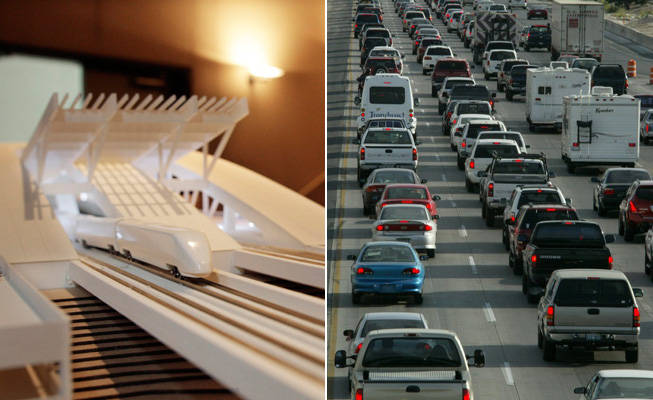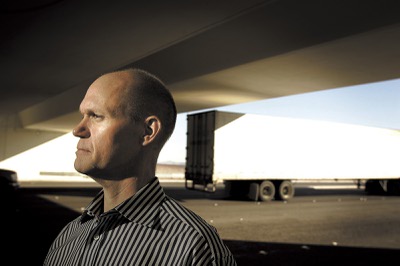
LEFT: A model of a proposed Victorville station for the DesertXpress high-speed rail project is shown. RIGHT: Motorists navigate rush hour traffic on Interstate 15 near the Strip. (Las Vegas Sun file photos)
Wednesday, Sept. 8, 2010 | 2:05 a.m.
Sun coverage
Las Vegas could become the crossroads of the West with a new Interstate 15 corridor study, a proposed Interstate 11 and planned connections to a high-speed rail network, a transportation expert said on Tuesday.
Tom Skancke, president of The Skancke Co. Ltd., told the Nevada Contractors Association at a lunch meeting that there are challenges in developing transportation infrastructure, including how to pay for it, but the potential reward is economic diversification for the region.
“This is probably the most important critical issue to our nation’s long-term economic sustainability,” Skancke told about 100 association members gathered at the Rio.
Skancke said the Nevada Department of Transportation recently awarded an I-15 corridor study. A similar project was undertaken for Interstate 95 from Florida to Maine. The purpose of the study is to develop expansion and improvement strategies for the length of the highway.
The study will include I-15 from San Diego to Salt Lake City. Skancke said Idaho and Montana did not opt to participate.
Skancke said a section of I-15 in Southern California illustrates why communities along the highway need to work together.
“When the I-15-Interstate 215 intersection in San Bernardino County fails, the whole system fails,” he said.
He said the intersection was designed in 1958 to carry 15,000 vehicle trips a day. Today, the intersection handles 122,000 truck trips alone, serves 65,000 residents of Victorville on their trips to the Los Angeles basin and is a conduit for about 11 million visitors a year to Southern Nevada.
“It is the most significant intersection in all of the West,” Skancke said. “In the past, we have looked at (the cities along I-15) as competition. Today, we need to look at them as complementing us as partners.”
Another highway transportation project that would affect Las Vegas’ future is a proposal to upgrade U.S. 93 and U.S. 95 to interstate highway standards. The proposed I-11 would run from Phoenix to Seattle, and I-15 would become an important intersection.
The proposal takes on added importance with China’s emergence as the world’s dominant economic power.
China has invested in deep-water ports at Punta Colonet, Baja California, and Lazaro Cardenas, Michoacan, to import goods to North and Central America. Southern California ports can’t accommodate most of the new supercargo ships, Skancke said.
A third infrastructure component is high-speed rail.
Skancke was one of the engineers of the Western High Speed Rail Alliance, which includes transportation organizations in Las Vegas, Phoenix, Denver, Salt Lake City and Reno.
He said the alliance is working as a single entity to develop a high-speed rail network and apply for funding for the West. Intermountain western states were shut out when the federal government doled out $8 billion in high-speed rail stimulus funds.
Skancke said the alliance avoided being involved with California’s high-speed system because it didn’t want to get entangled in the state’s political issues. But the alliance has done more in one year than backers of the Pacific Northwest’s proposed Cascadia high-speed system between Vancouver, British Columbia, and Eugene, Ore., has done in 20 years, he said.
While Las Vegas has the potential of becoming a center of transportation in the West, Skancke said, there are huge obstacles to overcome. The largest may be changing the planning mindset, a major cultural shift.
“Our problem is that we react; we don’t plan,” Skancke said. “We’re really good at crises and wars. We’ve got those two things down pat. But if we don’t declare war on this transportation crisis, we won’t have anything to react to. It’s that serious. Someone needs to stand up and say, ‘Here’s the vision for the future of our country.’”
At the root of the issue is money, and Skancke said the nation needs a long-term stable funding source.
He proposes an increase to the fuel tax, the implementation of congestion management and tolling, and a study on implementing a vehicle-miles-traveled use fee.
Skancke said increasing the fuel tax by 3 cents a gallon would generate more than $200 billion a year.
“We need about $225 billion a year on the low end just to sustain the current system,” Skancke said.
Experts have talked about congestion management and tolling, but Skancke acknowledged that “it just never gets there.”
Congestion management and tolling have been proposed as private-sector investments in highway systems.
Congestion management involves charging motorists a fee to use special lanes when traffic is heavy. Tolls generate revenue from any motorist choosing to use a toll highway.
Vehicle-miles-traveled use fees, or VMTs, are a fix for the inevitable wave of issues that will arise as more motorists shift to energy-saving electric vehicles.
Skancke believes that state and federal governments need to think ahead about the impact electric vehicles will have on gasoline-tax revenue.
“Somebody has to champion a VMT,” Skancke said. “Without it, we have no way of sustaining our highway trust fund.”
Skancke said the National Car Rental chain intends to purchase 500 electric vehicles and station 100 of them in Las Vegas.
“To my knowledge, there are only four places to plug in a car in Las Vegas, and all of them are at CityCenter,” he said. “If companies like National are going to start plopping these vehicles into cities, the reality is that we should start capturing that fuel tax.”
Carnival lasts all year at the Rio. With a float occasionally passing overhead and dropping beads while feathered dancers fire up the gamblers below, the Rio tries to keep its 120,000-square foot casino jumping with excitement. Special Brazilian mixed-drinks are also served throughout the casino. The hotel suites tend to be larger than similar priced rooms on the Strip and many offer excellent views with floor to ceiling windows.
The Rio offers some quality shows like "Penn & Teller" and "Chippendales." Many come to the Rio for the nightlife at the VooDoo Lounge, located on the 51st floor, or McFadden's Irish Pub on the casino level.
Others come for a bit relaxation at the Rio Spa or pool area and still others come to shop at the hotel's 60,000 square feet of shops. In each of these endeavors, the Rio attempts to make the experience a bit more fun and spontaneous.
The Rio also offers guests a variety of dining choices from all-American food at the All-American Bar & Grille to Gaylord India Restaurant for something a little spicier and even Carnival World Buffet for the indecisive.


Join the Discussion:
Check this out for a full explanation of our conversion to the LiveFyre commenting system and instructions on how to sign up for an account.
Full comments policy